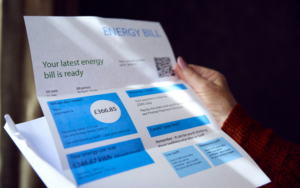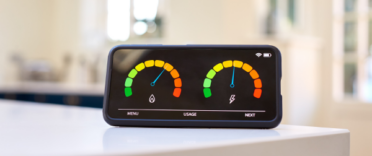 The energy price cap rose by 1.2% on the 1st January 2025 meaning the average annual household dual-fuel energy bill has increased from £1,717 to £1,738, a rise of £21 per year. Additionally, energy analysts Cornwall Insight have announced their latest forecast for April's energy price cap figures, expecting a further 3% rise. If that does materialise, it will mean the energy price cap could rise to around £1,785, an extra £4 per month on the average dual-fuel household bill.
The energy price cap rose by 1.2% on the 1st January 2025 meaning the average annual household dual-fuel energy bill has increased from £1,717 to £1,738, a rise of £21 per year. Additionally, energy analysts Cornwall Insight have announced their latest forecast for April's energy price cap figures, expecting a further 3% rise. If that does materialise, it will mean the energy price cap could rise to around £1,785, an extra £4 per month on the average dual-fuel household bill.
What is the energy price cap?
The energy price cap was introduced by Ofgem to control the maximum amount that energy providers are allowed to charge consumers for each unit of gas and electricity. Ofgem calculates the price cap every three months and takes into account the cost of VAT, wholesale energy prices, and the cost of providing energy. It then provides an annual figure based on the average dual-fuel household that pays via direct debit.
The energy price cap is based on the average dual-fuel household bill and how much you will actually pay will vary depending on how much energy you use.
Energy price cap figures - 2021 to 2025
We provide a brief history of the energy price cap figures going back to 2021 below.
| Date Energy Price Cap is effective from | Energy Price Cap |
| 1st April 2021 | £1,084 |
| 1st October 2021 | £1,216 |
| 1st April 2022 | £1,877 |
| 1st October 2022 | £3,371 |
| 1st January 2023 | £4,059 |
| 1st April 2023 | £3,116 |
| 1st July 2023 | £1,976 |
| 1st October 2023 | £1,834 |
| 1st January 2024 | £1,928 |
| 1st April 2024 | £1,690 |
| 1st July 2024 | £1,568 |
| 1st October 2024 | £1,717 |
| 1st January 2025 | £1,738 |
How much will I pay for energy under the new price cap?
The following table shows how much you can now expect to pay for each unit of gas and electricity. The figures will vary depending on where you live in the UK. Remember, the amount you pay under the new price cap will be based on your energy usage and the charges stated below, assuming you pay by direct debit.
| Previous energy price per unit
(1st October - 31st December 2024) |
New energy price per unit
(1st January - 31st March 2025) |
|
| Electricity | Daily Standing charge: 60.99p
Unit price per kWh: 24.50p |
Daily Standing charge: 60.97p
Unit price per kWh: 24.86p |
| Gas | Daily Standing charge: 31.66p
Unit price per kWh: 6.24p |
Daily Standing charge: 31.65p
Unit price per kWh: 6.34p |
(Source: Ofgem)
To keep your next energy bill as accurate as possible, make sure to send your latest gas and electricity meter readings as soon as you can.
If you do not, you may find that some of your usage for this month is charged at the old rate. Of course, any household with a smart meter does not need to worry, as your usage will be tracked automatically.
What will happen to the energy price cap in the future?
Forecasters expect the price cap to rise from 1st April 2024, the next point at which it can change. Consultancy firm Cornwall Insight predicts that the typical household annual bill will rise to around £1,785 from 1st April 2025. That would be a £47 increase from the current level, equivalent to a 3% rise.
This is merely a prediction and is based on a number of factors including the recent uncertainty over the gas transit deal between Russia and Ukraine. Dr Craig Lowrey, the principal consultant at Cornwall Insight, stated, "With a Trump presidency on the horizon, and an uncertain geopolitical situation in the Ukraine and the Middle East, wholesale market volatility looks set to remain".
Is now a good time to switch to a fixed energy tariff?
You need to consider what is important to you. The energy price cap changes every 3 months, while fixed deals typically last 12 or 24 months. There is a danger that should you fix it, a better deal may be just around the corner. The real benefit of fixing your energy deal is the assurance that you know exactly what you will be paying for your energy over a set period. While better deals could come to market during your fixed period, you are protected should there be a sudden surge in energy prices.
Looking at the current predictions, if you can find a fixed deal that is around 5% cheaper than the latest Energy Price Cap figure, you are likely to pay less on your fixed deal compared to staying on your provider's standard rate. Remember, this is assuming that future predictions are correct and come to fruition.
Alternatively, if you simply want to ensure you pay less than the energy price cap and are not worried about a spike in energy prices then Eon Next's Pledge tariff might be worth considering. Unlike a fixed energy tariff, rather than providing you with a set price for your energy, the tariff fluctuates, tracking 3% below the energy price cap figure. We cover this tariff in more detail and provide a roundup of the best fixed-rate tariffs on the market in our article 'What is the cheapest fixed price energy tariff? - Best deals compared'.
Compare energy deals
Protect yourself against high energy rates by comparing energy deals with Uswitch
- Enter your postcode
- Compare energy deals
- Switch energy in minutes
What to do if you're struggling to afford your energy bills
Your energy supplier may be able to help you arrange an affordable repayment plan if the cost of energy is becoming overwhelming, so it is best to contact them as soon as possible. In our article, 'How to save money on your energy bills' we provide some tips for you if you are struggling to afford your energy bills.
There are also a number of grants and schemes available for those who are most vulnerable. More information and details of where you can get further help can be found in our Money saving guide.





